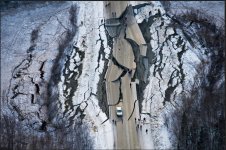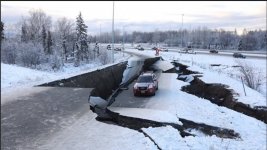Preppers often say they want a radio to check in on the local situation after a disaster. Here is an example of why ad-hoc nets by untrained hams aren't such a great idea. In 2018 we had an M 7.1 earthquake just north of Anchorage. After the shaking stopped and I had checked that we were all safe and our home had suffered no serious damage, I turned on my radio and listened to the traffic on our most active local repeater.
First someone reported that
"Vine Road near Wasilla is blocked!". The problem is that Vine Rd is fairly long. To his credit, whomever was acting as the impromptu net control tried to get more info, like exactly where it was blocked. The answer was
"I don't know, I just heard it from a friend..." Not terribly useful info. (The Vine Rd collapse was one of the two images which were played incessantly ad nauseum on the national media.)

Then another guy came on and said
"The overpass on Minnesota Dr has collapsed and a car is trapped!" What sort of image does that conjur up in your mind? Maybe some poor schmuck crushed in his car under tons of concrete? A job for FD Heavy Rescue? Minnesota has several overpasses, but again when pressed for details, he just heard if from someone else. This was the other image that was played over and over again on TV. It turns out that the off-ramp to International Airport Rd had caved in, and a car was indeed trapped, but undamaged. I've been told it was a rental the guy was returning to the airport. He walked the mile to the airport, gave the keys to the rental company and told them where it was, and caught his flight.

The most egregious thing I heard was someone reporting that
"I just talked to my daughter, and she says the USGS says there will be another even larger quake, within the hour!" which is total BS. The USGS made no such prediction. This was the one time I keyed up and transmitted on this so-called net. I politely replied that this wasn't true. The USGS did make a probabilistic estimate of aftershocks (there will be many, for a long time, and some may be quite powerful), and that there is an extremely small but non zero probability that this might be a foreshock to a bigger quake (rare but it's been known to happen). They most definitely DID NOT predict a "larger quake within the hour".
The first takeaway message is that any information you get from an impromptu ad-hoc emergency net is at best likely to be incomplete and misleading, and possibly flat out wrong. The other takeaway is that if you do report something, be very careful that what you say is accurate and as complete as possible. Do not report stuff that "They Say...." or "I heard that..." Unless you actually have eyes on it and can provide an accurate description and location, don't report it. Disasters and other emergency situations are confusing and chaotic enough, without adding incomplete or totally bogus information to the problem.
One last point, from what I understand, for the most part our official emergency comms systems worked just fine during and after the earthquake. One friend at a VFD near Anchorage said they lost some comms very briefly (not sure of the details), and a State Trooper involved in emergency management commented that they had some trouble with cell networks being overloaded (not sure if he had First Net?). Our state ALMR (Alaska Land Mobile Radio) system stayed up and worked fine.



